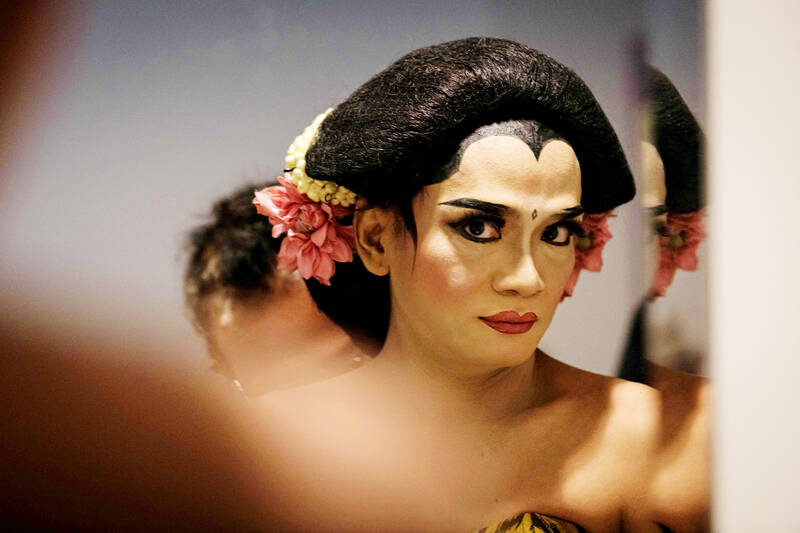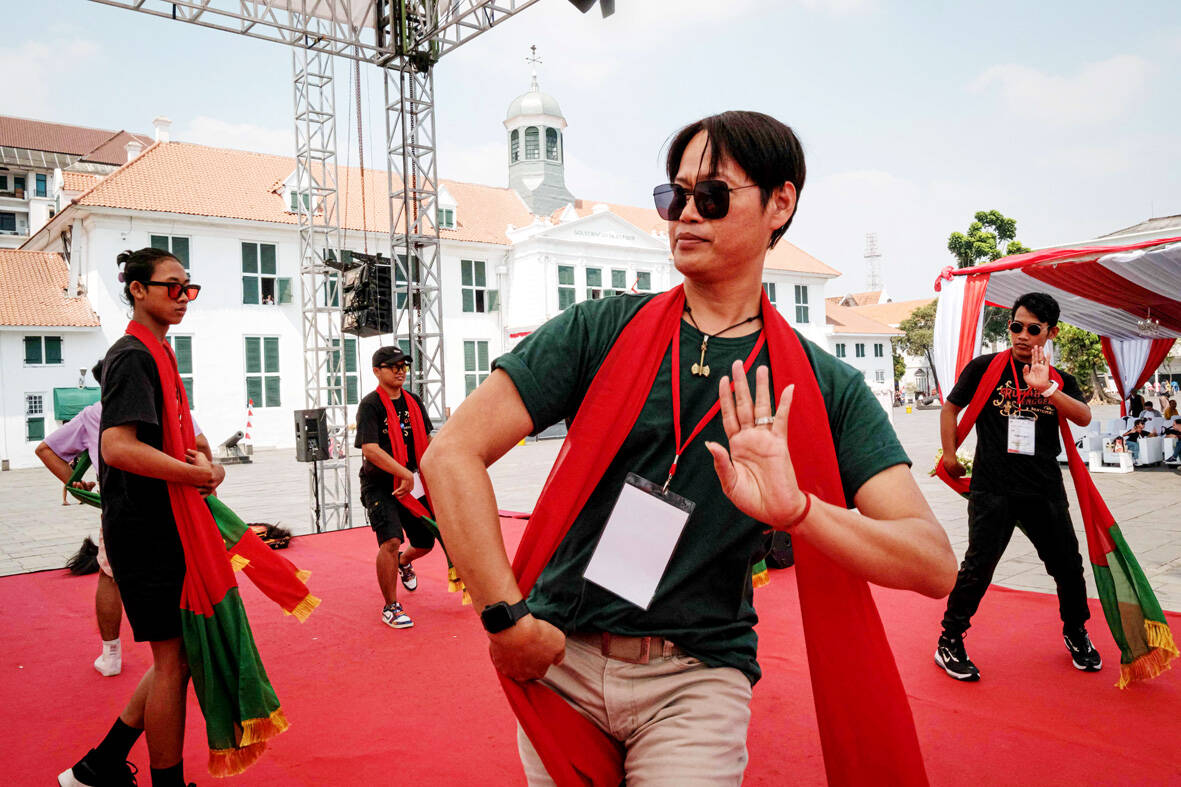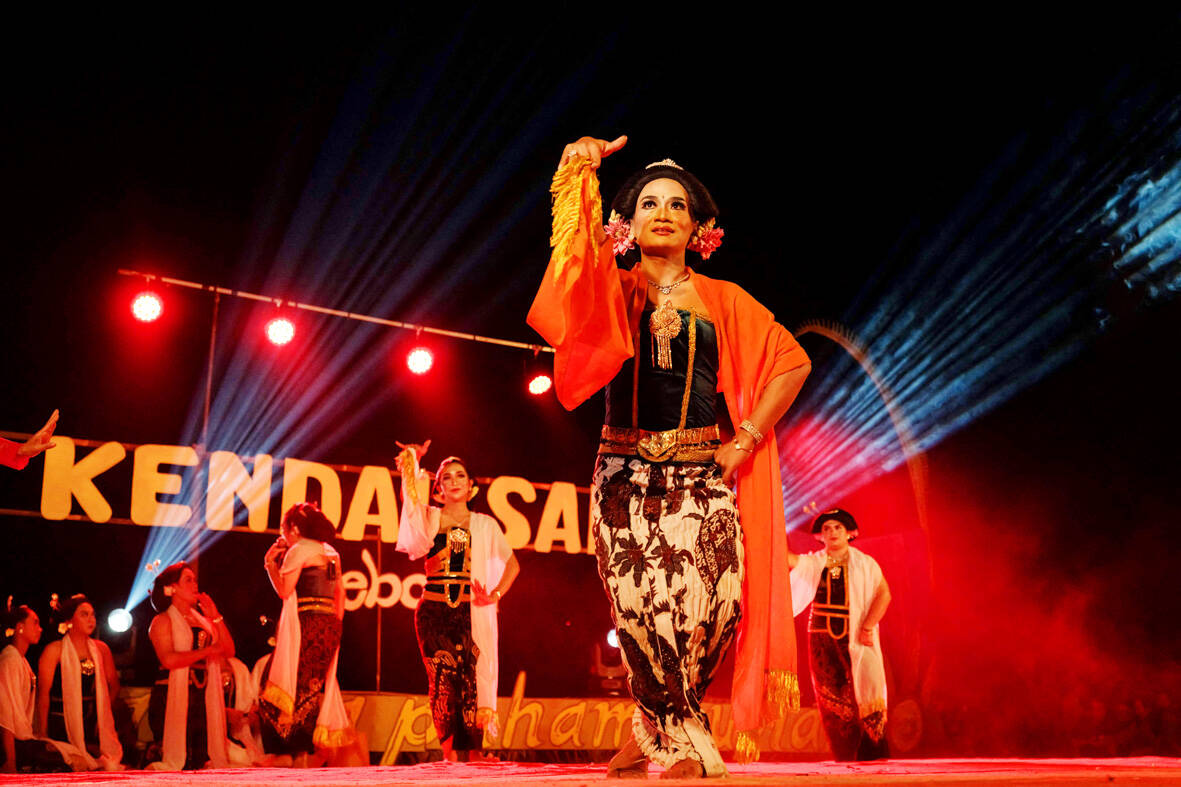Indonesian dancer Rianto moves gracefully in front of a crowd of thousands in the capital Jakarta, whipping his orange sash and in full make-up as he performs a centuries-old folk dance frowned upon by conservatives.
The Lengger Lanang dance tradition is rooted in 16th-century fertility and harvest rituals from Central Java province. It has since evolved into an art form that challenges rigid beliefs around masculinity in a deeply conservative and religious society.
Lengger Lanang is performed by men dressed as Javanese princesses, wearing tight, colourful batik dresses and ornaments woven into their fake hair bun updos.

Photo : AFP
But the tradition is close to disappearing in the Muslim-majority country, with fewer than 100 performers courageous enough to take part in shows.
“Lengger is still looked down on and negatively stigmatized,” 42-year-old dancer and choreographer Rianto said.
“People still see men dancing as going against the norm,” Rianto, who like many Indonesians has one name, added.

Photo : AFP
Backed by lively Javanese beats and melodies, the dancers sway their hips, flick their fingers and throw seductive glances at the audience in a Jakarta theatre.
The performers crack jokes in deep baritone voices, reminding their audience that, while they are wearing dresses, they are male.
“Lengger Lanang is where masculine and feminine meet inside one body and it is aimed to create peace within oneself,” said Rianto, who is married to a Japanese woman.

Photo : AFP
VANISHING ART
Lengger was once a highly revered folk art where performers were idolized and respected as performers able to embody both genders. But it is being challenged as prejudice grows against anything perceived as queer-related.
A 2018 movie about a Lengger Lanang dancer loosely based on Rianto’s life story received critical acclaim but was banned in several Indonesian cities after conservatives said it promoted homosexuality.
In the Central Javan town of Banyumas where Lengger Lanang was born, an art festival held in September is one of the few places where the art form can be celebrated openly. The dance was once considered a sacred tradition in the town.
“It was a post-harvest ritual to express gratitude to the goddess of fertility, later adapted into a form of entertainment, sometimes to welcome a grand guest,” Lynda Susana Ayu Fatmawati, cultural researcher at Jenderal Soedirman University, said.
Even today, in order to become a Lengger Lanang dancer, one must undergo several cleansing rituals such as fasting, bathing in springs, and meditation.
Before each performance, the dancers light incense, and lay out flower petals and coconuts as offerings to God.
’CHOSEN ONES’
Even though the dance is rooted in tradition, some conservative Muslims say men should not dress or act like women.
“In Islam, it’s clear that a man should not dress or act like a woman, and vice versa. It was condemned by the prophet,” Taefur Arofat, chairman of Banyumas Ulema Council, the town’s top Islamic body, said.
For Rianto and other dancers, that perception has made everyday life hard.
“Being a male dancer is very difficult. The stigma from the public is very negative because dancing is associated with femininity,” said Rianto.
Another dancer Torra Buana said he had to keep his dancing a secret.
“I once hid it from my family. Some people viewed it as a negative thing,” the 47-year-old said.
“But not all men can do this,” he said, referring to his dance form. “Only the chosen ones who have been blessed by God.”
PRESERVING LENGGER
Not all Indonesians have a problem with the tradition.
“It’s art and we need to prevent it from disappearing,” spectator Hendro Utomo said after the Jakarta show. Rianto has established Rumah Lengger, a center where young dancers can practice and learn the philosophy behind the art. One of the young prodigies is Ayi Nur Ringgo, who fell in love with the tradition after watching videos at university.
After taking it up, he was forced to confront negative comments from classmates.
“I have made peace with myself and my strength,” he said.
“I no longer care.” Under Rianto’s wing, he and fellow dancers are working to keep the tradition alive.
“I want to continue and regenerate this culture,” Rianto said. “Don’t let this fade away.”

June 2 to June 8 Taiwan’s woodcutters believe that if they see even one speck of red in their cooked rice, no matter how small, an accident is going to happen. Peng Chin-tian (彭錦田) swears that this has proven to be true at every stop during his decades-long career in the logging industry. Along with mining, timber harvesting was once considered the most dangerous profession in Taiwan. Not only were mishaps common during all stages of processing, it was difficult to transport the injured to get medical treatment. Many died during the arduous journey. Peng recounts some of his accidents in

“Why does Taiwan identity decline?”a group of researchers lead by University of Nevada political scientist Austin Wang (王宏恩) asked in a recent paper. After all, it is not difficult to explain the rise in Taiwanese identity after the early 1990s. But no model predicted its decline during the 2016-2018 period, they say. After testing various alternative explanations, Wang et al argue that the fall-off in Taiwanese identity during that period is related to voter hedging based on the performance of the Democratic Progressive Party (DPP). Since the DPP is perceived as the guardian of Taiwan identity, when it performs well,

The Taiwan People’s Party (TPP) on May 18 held a rally in Taichung to mark the anniversary of President William Lai’s (賴清德) inauguration on May 20. The title of the rally could be loosely translated to “May 18 recall fraudulent goods” (518退貨ㄌㄨㄚˋ!). Unlike in English, where the terms are the same, “recall” (退貨) in this context refers to product recalls due to damaged, defective or fraudulent merchandise, not the political recalls (罷免) currently dominating the headlines. I attended the rally to determine if the impression was correct that the TPP under party Chairman Huang Kuo-Chang (黃國昌) had little of a

At Computex 2025, Nvidia CEO Jensen Huang (黃仁勳) urged the government to subsidize AI. “All schools in Taiwan must integrate AI into their curricula,” he declared. A few months earlier, he said, “If I were a student today, I’d immediately start using tools like ChatGPT, Gemini Pro and Grok to learn, write and accelerate my thinking.” Huang sees the AI-bullet train leaving the station. And as one of its drivers, he’s worried about youth not getting on board — bad for their careers, and bad for his workforce. As a semiconductor supply-chain powerhouse and AI hub wannabe, Taiwan is seeing